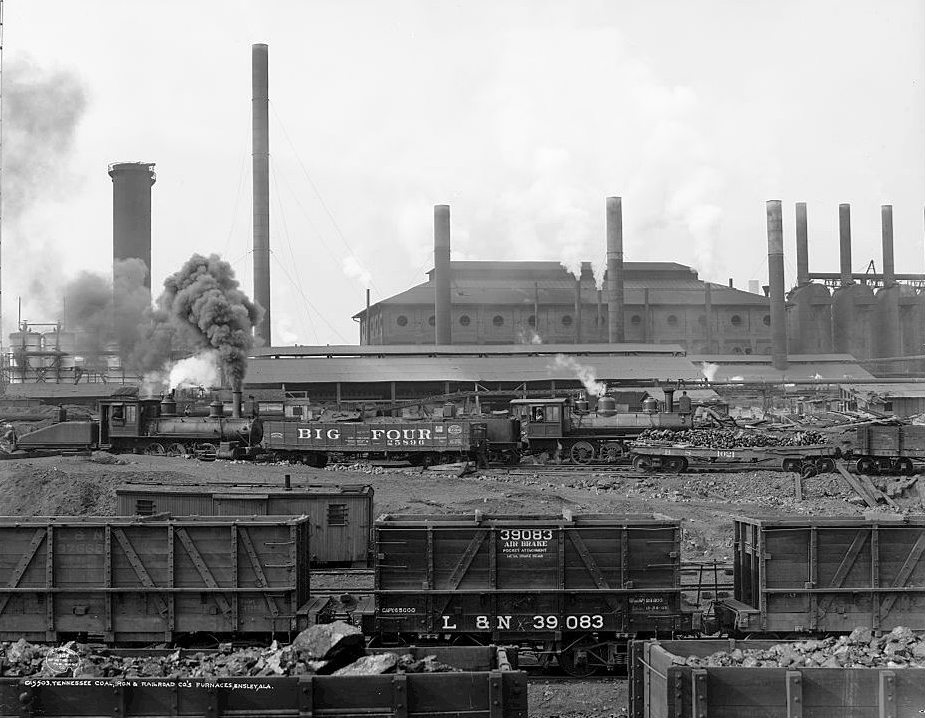
Tennessee Coal, Iron and Railroad Company
The Tennessee Coal, Iron and Railroad Company (1852–1952), also known as TCI and the Tennessee Company, was a major American steel manufacturer with interests in coal and iron ore mining and railroad operations. Originally based entirely within Tennessee, it relocated most of its business to Alabama in the late nineteenth century, following protests over its use of free convict labor. With a sizable real estate portfolio, the company owned several Birmingham satellite towns, including Ensley, Fairfield, Docena, Edgewater and Bayview. It also established a coal mining camp it sold to U.S. Steel which developed it into the Westfield, Alabama planned community.[1]
Company type
1852
1952
Became division of United States Steel Corporation
Tennessee Coal & Iron Division: United States Steel Corporation
- Steels
- Integrated Steel Products
- Rail Transport
- Real Estate
United States Steel Corporation (from 1907)
At one time the second largest steel producer in the United States, TCI was listed on the first Dow Jones Industrial Average in 1896. However, in 1907, the company was merged with its principal rival, the United States Steel Corporation. The Tennessee Coal, Iron and Railroad Company was subsequently operated as a subsidiary of U. S. Steel for 45 years until it became a division of its parent company in 1952.
History[edit]
Early history[edit]
The Tennessee Coal, Iron and Railroad Company was founded as the Sewanee Furnace Company,[2] a small mining concern established in 1852 by Nashville entrepreneurs[2] seeking to exploit Tennessee's rich coal reserves and the 19th century railroad boom. After losing money, the business was sold to New York investors in 1859 and reorganized as the Tennessee Coal and Rail Company,[2] but the outbreak of the Civil War the following year saw the fleeting company repossessed by local creditors.
It became Tennessee's leading coal extractor over the next decade,[2] mining and transporting coal around the towns of Cowan and Tracy City in the Cumberland Mountains,[3] and soon branched out into coke manufacture.[2] This practice of both extracting and moving coal to market by building private rail tracks was not unusual at the time, as by owning the tracks that served their mines, businesses could undercut rivals at market by saving money on transportation. A Thomas O'Connor purchased the company in 1876 and expanded the business into iron manufacture in order to stimulate coke sales, building a blast furnace near Cowan.[2] The business was subsequently renamed the Tennessee Coal, Iron, and Railroad Company. TCI never again changed its name, despite its later expansion into Alabama following the 1886 purchase of the Birmingham-based Pratt Coal and Iron Company.[3]
As the company grew in the post-Civil War era, it made extensive use of convict labor, its leaders arguing that this labor was more reliable than paid (and often unionized) labor. The company operated a stockade prison near Tracy City, which was the subject of labor unrest at the time of the Coal Creek War in northeastern Tennessee. Conditions in the prison and the coal mines were harsh, with the prison population dying at an average rate of 10% per year during its period of operation. The company also provided convict labor to other coal mining operators when they experienced or were threatened by labor action. Hostility in the state to the use of convict labor led to its end there in 1896.[4] TCI relocated its offices to Birmingham in 1895,[3] where it could still use convict labor, relegating its native state to relative unimportance.
Current operations[edit]
The last relic of the Tennessee Coal, Iron and Railroad Company, the Fairfield Plant, continues to be operated by U. S. Steel as one of its five integrated steel mills in the US. It is the largest steel-making plant in Alabama,[15] employing 2,000 workers as of September 2006,[16] down from a peak of 45,000 during World War II. With a single blast furnace and three basic oxygen process furnaces,[17] amongst other various mills and production facilities, the plant produces 2.4 million tons of raw steel per annum[17] and 640,000 tons of seamless tubular and sheet products, mainly for purchase by the booming oil industry.[17]
August 17, 2015, U. S. Steel President and CEO Mario Longhi announced, "We have determined that the permanent shut-down of the Fairfield Works blast furnace, steelmaking and most of the finishing operations is necessary." The decision does not impact Fairfield Tubular Operations or the electric arc furnace (EAF) construction project. 1,600 workers were laid off by November 17, 2015.[18]